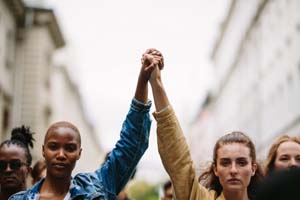Normalizing the Perception of Women

 The first two hundred years of the Enlightenment was a definite and unfortunate continuity in the medieval (and much earlier) perception of women as being less than equal to men. The inadequacy of the literati of the Enlightenment to remedy this imbalanced situation reveals how deeply our ancestors’ views of women as inferior was embedded in the social psyche of men. The role of women in the Western and industrial countries improved but still far from being perfect. Modern human rights and women’s rights must extend to the global level, including the countries where women have no voice and no means to represent themselves. Let us put it more bluntly: currently women in some backward countries have less rights than a cow or a dog in the West –beings that cannot represent themselves, just like women can’t represent themselves in some societies. If we have worked so hard to protect animals and trees in the West, why have our progressive global institutions failed to uphold equal rights to half of the human population. Different organizations and the UN demonstrating cultural sympathy or tolerance for religious differences have only disfranchised women in those societies which do not value women to have equal worth as men. These cultural and religious prisons of women for our time and generation shall not stand. We are Homo sapiens, one human family and one planet, therefore we all must enjoy our natural freedom as a wise species.
The first two hundred years of the Enlightenment was a definite and unfortunate continuity in the medieval (and much earlier) perception of women as being less than equal to men. The inadequacy of the literati of the Enlightenment to remedy this imbalanced situation reveals how deeply our ancestors’ views of women as inferior was embedded in the social psyche of men. The role of women in the Western and industrial countries improved but still far from being perfect. Modern human rights and women’s rights must extend to the global level, including the countries where women have no voice and no means to represent themselves. Let us put it more bluntly: currently women in some backward countries have less rights than a cow or a dog in the West –beings that cannot represent themselves, just like women can’t represent themselves in some societies. If we have worked so hard to protect animals and trees in the West, why have our progressive global institutions failed to uphold equal rights to half of the human population. Different organizations and the UN demonstrating cultural sympathy or tolerance for religious differences have only disfranchised women in those societies which do not value women to have equal worth as men. These cultural and religious prisons of women for our time and generation shall not stand. We are Homo sapiens, one human family and one planet, therefore we all must enjoy our natural freedom as a wise species.
The West was similarly trapped in the male domineering culture for a long time even during the Enlightenment. The language of the Enlightenment literature itself, tenaciously revolving solely around men: “all men are created equal…in pursuit of happiness” “… equality, liberty and fraternity” (sorority is/was not included). Women were not even considered relevant in the discussion. It is true that a number of prominent British and French enlighteners did bring up the equality of men and women, but too insignificantly to gain any momentum. The published literary works and campaigns of women in the 18th and 19th centuries were also marginalized and even suppressed. Women’s ability to have a substantive political role in society and enjoy equal rights remained elusive during a major part of the Enlightenment. Despite this, progressive and educated women continued their debates in the coffeehouses and salons, laying the groundwork for future movements such as suffragettism and political activism.
The exclusion of women holding distinct and lesser roles in society and being seen as less capable continued well into the 20th century in Europe and America. As it is known, the suffragette movement gained voting rights for women, although there was still a long road to freedom and equality. It’s still a puzzle that the Enlightenment, with its modern reasoning power, could have broken this cycle of injustice that was initially imposed on women. But women continued to be exploited by the dominant male culture. The leap forward for women’s rights was finally accomplished through a gender war carried out by women themselves at different times around the world. The impetus for universal suffrage for equal rights and for women the right to vote in England, Austria and Germany began in 1918. In the U.S. with abolishing slavery in 1865 the suffragette began the upwelling of energy leading to the emancipation of women and her right to vote in 1920.
However, many places around the world did not, and even today have not yet, given women full rights truly equal to the men in their society, whether it is the right to own property, the right to vote, or many other such essential rights as members of a society.
The Campaign is Making a New Start
The 21st century is a thus century of paradigm shift, not only for the emancipated Western women, but is also a critical chance for the liberation of those women around the world who live in traditional-religious societies with unequal value systems. The Second Enlightenment is a concrete opportunity to apply reason, science and empathy to create truly equal rights between men and women, principles that distinguish us Homo sapiens from those primitive primates in the forests where the role of the alpha male and subservient females continues to be the way of nature. In human history, we have followed this biological pattern that has led to entrenched patriarchy in human society for millennia, but we no longer need to be slaves to our ancient biology. We can let go of the practice of archaic patriarchy.
What is important here is that the path of emancipation of women can only remain irreversible and strong if the control of their rights does not fall into the hands of regressive thinkers, legislators, and those men who still view women as being subordinate. Modernity is quite fragile, and the forces of anti-modernity are still threatening to take women back to the dark past.
Modernity and modern thinking should inspire a visionary perspective to imagine, to really deeply envision half of the world’s population – the women – leading our societies to places never imagined before. Imagine a world where there will be no war, where parenthood and the education of children are no longer a nominal responsibility but instead represent a true love for a vibrant life of a child and her future as an adult. There could be a balanced, respectful shared power between men and women in the world to ensure that all voices are heard. The success of women is not about becoming just successful entities in politics or financial world like their male counterparts, but instead it is about showing men a world that they have never seen or imagined or experienced before.
The perception of women as a restricted class without full opportunity to fully engage in a society at all levels in many traditional and religious societies has remained a hindrance in the advancement of women. The challenge of 21st century is the confrontation between human rights-women rights and the authority of archaic cultures, which regard women as subordinates. The challenge is that the universal human rights championing women such as the UN Charters, cannot directly dictate the emancipation of women in ultrareligious or traditional cultures. It would seem as the violation of those culture, and the old-fashioned anthropology backs the notion of diversity and respecting other cultures. However, in the Second Enlightenment, we require an iconoclastic global stance to break the ice and liberate millions of women trapped in the bondage of their religious and ancestral heritage dominated by men. The fair ground is that the choices should be made by women themselves in those patriarchal cultures, not the men who have controlled them for centuries. Women are not property of any man, nor should any men decide for them. Men will have to curtail their alpha male inclinations and find their own role in the society instead of dominating women and interfering in their destiny.
It is hoped that in the Second Enlightenment, any structural violence against women in any society should be considered CRIME against humanity punishable by law!
